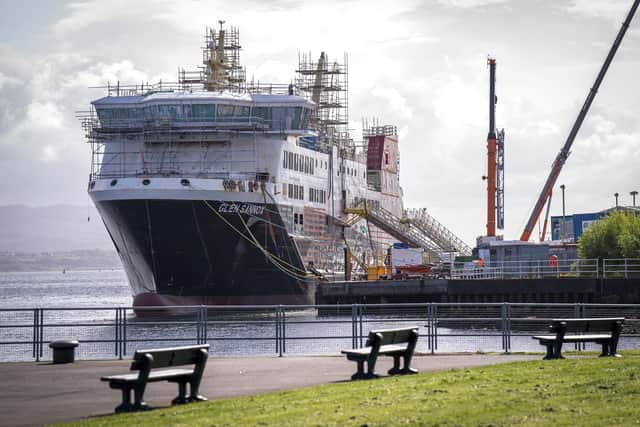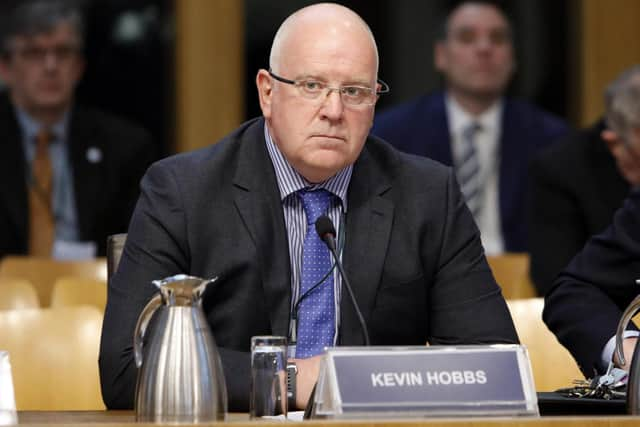Ferry scandal Scotland: Top lawyer's investigation into 'rigged' contract will not 'let us off the hook', says ferry chief
However, Kevin Hobbs, chief executive of Caledonian Maritime Assets Ltd – which owns Scotland’s ferries and associated infrastructure, said he could not commit to making the result of the investigation public.
Mr Hobbs made the comments in an interview with The Scotsman when he was asked to respond to BBC allegations that the contract for embattled hulls 801 – named MV Glen Sannox – and 802 had been “rigged”.
Advertisement
Hide AdAdvertisement
Hide AdThe two ferries, being constructed by Ferguson Marine shipyard, are more than six years late and will cost more than £300 million, at least £200m over budget.


Mr Hobbs indicated the two ships were likely to be delayed again, dependent on the outcome of the ongoing dock of hull 801.
However, CMAL faces significant and pressing questions about its conduct around the initial award of the contract to Ferguson Marine, then owned by pro-independence business tycoon Jim McColl.
The BBC documentary The Great Ferries Scandal published allegations that a key technical document of over 400 pages found its way into the hands of Ferguson Marine, with The Scotsman reporting it had been passed to the shipyard by a consultancy firm named Houlder Ltd, who had worked for CMAL at the design stage.
This document was heavily plagiarised by Ferguson Marine for their bid. The lack of a full builder’s refund guarantee from the yard may also have broken CMAL’s own procurement rules.


The Scotsman revealed in February that CMAL had appointed a top lawyer, Barry Smith KC, to undertake an investigation into the allegations.
Mr Smith is an expert in regulatory prosecutions. CMAL have consistently claimed there is “no evidence” the contract was rigged in favour of Ferguson Marine.
Asked whether Mr Smith’s report would be used to get CMAL “off the hook” for the allegations raised by the BBC, Mr Hobbs was unequivocal.
Advertisement
Hide AdAdvertisement
Hide Ad“No,” he said. "It wasn’t our choice, it was [Edinburgh law firm] Addleshaw Goddards who did the research and,ultimately, there are not that many people in Scotland or indeed the UK who have that strange mix of understanding criminality which is fraud, and also being experts in procurement.
"The field is extremely narrow. We decided we were going to do this back in October/November last year, and really it has only just started because these people are extremely busy.”
The investigation report will be for the CMAL board to consider, Mr Hobbs said, with no guarantee it will ever be made public. CMAL’s sole shareholders are the Scottish Ministers.
Mr Hobbs also faced criticism for failing to answer questions as part of the documentary. The Scotsman later published emails from the chief executive where he said the documentary was “looking for a sensational angle”, with CMAL, ferry operator CalMac, and Transport Scotland working together to avoid public questions.
Asked why he had refused to be interviewed, Mr Hobbs said that, had he been at CMAL at the time of the contract award, he would have done the interview.
He said: “The point we made consistently which then led to being chased across a car park was: Why do you want to interview me when I wasn’t here at the substantive time that this all took place?
"We said ‘look, it’s pointless interviewing me because while I’m the current CEO, I wasn’t the CEO here at the time.
"What we were worried about was that there will be a whole bunch of questions that I would just be looking like I was being evasive by saying ‘I don’t know, I wasn’t here’, that wasn’t the rationale behind it.
Advertisement
Hide AdAdvertisement
Hide AdHe added: "I’m not some shrinking violet that would shy away from it, if we had something genuine to say and had I been employed here in 2014, I would have been happy to speak to the BBC.”
"We have no evidence of it [being rigged]. I’m not saying whether it was rigged or whether it wasn’t rigged, what I’m saying to you is that we’ve got no evidence of it.”
Asked about the suggestion the key technical document had been shared by Houlder Ltd, who had worked with CMAL and allegedly been recommended to Ferguson Marine by the ferry body, Mr Hobbs said there was no evidence of that.
He also repeated his belief that the 424-page document would have been “unhelpful” to CMAL, despite it containing detailed information on what was needed for the vessels.
“Everything we wanted any contracting party to know about to enable them to bid for that ship was in that core ITT document.
"Personally, having been around shipbuilding for many many years and worked in shipyards for shipbuilding companies, I would find it unhelpful to have that level of detail.”
Pressed on the fact the scoring for the bids included a checklist of requirements, almost all of which were likely to have been included in the SOTR document, he said that all bidders “did pretty damn well”.
"It’s quite a small element of the scoring,” he said. “It’s only 10 per cent of the 100 per cent relating to any of that stuff and actually when you look at it, all of them did pretty damn well.”
Advertisement
Hide AdAdvertisement
Hide AdMr Hobbs also said that, despite not being there at the time and therefore not having all the information that CMAL had at the time, his preference would likely have been to scrap the procurement and start again.
"That would be my feeling as a professional, absolutely scrap it and start again. But we have a shareholder,” he said.
"Would I be comfortable with it? No. But equally the board weren’t comfortable with it either, and our board is a professional board and the executive directors at the time were professionals. Nobody was happy with it.”
CMAL remains under pressure from the Scottish Government to ensure the ageing CalMac fleet is replaced and renewed, with the ferries being constructed by the now state-owned Ferguson Marine as part of this overall plan.
The two embattled ships are set to be delivered by May of this year and March of next year, however Mr Hobbs expects further delays, to be confirmed later this month.
He said: “I think we are anticipating a bit more slippage but we don’t know at the moment.
"Glen Sannox is in dock at the moment and they are doing a hell of a lot of underwater inspection stuff such as the driveshafts, the propeller hubs, the propellers, all of the things that have been static in the water for the best part of five years.
“I am concerned it might slip a bit more. We had disagreements on delivery dates with FMEL [Ferguson Marine Engineering Ltd] where we were years apart. We’re not weeks apart from them, but we’re not six months apart either.”
Advertisement
Hide AdAdvertisement
Hide AdThe total cost of replacing much of the CalMac fleet as well as other aspects of the ferry network is estimated to be around £1.4 billion over the next 10 years.
This figure, however, is likely to rise by another £200m due to inflationary pressures which have resulted in sky-high prices for key resources such as concrete and steel.
Part of the renewal programme will be the construction of at least 10 small ferries, with seven forming part of “phase one” of the small vessel replacement plan.
David Tydeman, the chief executive of Ferguson Marine, has said the contract for these ships is key for the yard’s future. Mr Hobbs, who will be under pressure to ensure the contract goes to Ferguson’s, said the small ships were “probably in that yard’s sweetspot in terms of their ability to do it”.
He added: “You might think that the pain that we’ve gone through with the two big ones that you wouldn’t even consider that shipyard, but we’re completely opposite to that. We absolutely believe that they could build those ships and build them very very well.”
However, there is not yet clarity on whether it is legally possible to award the construction of these vessels directly to Ferguson Marine and avoid an international tender process. That could see the contract go abroad, potentially following the contract for the replacement Islay vessels to Turkey.
“They [Ferguson Marine] will have to be competitive,” Mr Hobbs said. “But we want them to be competitive, and taxpayers of Scotland plc want them to be competitive.”
Holyrood’s Public Audit committee is set to publish its report on the ferries fiasco later this month following a bruising round of evidence sessions following the Audit Scotland report into the contract award.
Advertisement
Hide AdAdvertisement
Hide AdMr Hobbs said he preferred the professional approach of Audit Scotland to the political arena. "You can end up being used as a political football,” he said. “There is an awful lot of sniping, if you want to put it that way, from time to time, and people trying to prove their points from different parties.
"I find that a little bit disappointing.”
He also hit out at critics of CMAL, accusing a “small number of people that ultimately have an axe to grind” of being “vociferous” in their criticism.
“When I say mischief making, there are certain vociferous people out there that continually say ‘what’s the problem it is all easy’, and it is certainly not.”
Comments
Want to join the conversation? Please or to comment on this article.
